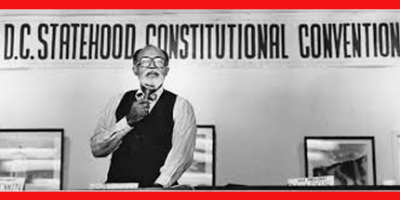Statehood on the DC Ballot
President Charles Cassell presiding during the 1982 Constitutional Convention
In 1980, Ed Guinan, founder of the Community for Creative Non-Violence (better known as CCNV), a former Catholic priest, and DC Statehood Party member, challenged the party’s Central Committee. He informed them that he would soon file a statehood initiative with the DC Board of Elections, and if enough petition signatures could be gathered, the November ballot would have a referendum calling for a convention to draft a state constitution. He was hoping to have the help of the DC Statehood Party, but he was prepared to collect signatures without their help. Although the members of the Central Committee felt the timing was not right for the party to take on a ballot initiative, they reluctantly decided they had to be part of the effort. “And that’s what wrecked all of our lives for nearly a year, because we had to gather thousands of signatures in five of the eight wards to put this thing on the ballot,” recalls Debby Hanrahan, who represented Ward 2 on the Central Committee. “And we could not let it fail. And so, this ragtag party picked it up and went with it.”
The ragtag party and other volunteers recruited by Ed Guinan, Lou Aronica, Jo Butler, and Debby Hanrahan managed to collect almost double the number of signatures required to put the statehood initiative on the ballot. The measure was opposed by the Evening Star, Delegate Walter Fauntroy, and the local League of Women Voters (which is now a very strong advocate of statehood). Fauntroy and the League, both very committed to the Voting Rights Amendment, were worried about the statehood effort interfering with the campaign for ratification of the amendment, and they felt that statehood was likely to mean a financial burden for DC residents.
Mayor Marion Barry and eight members of the DC Council made statements in favor of the initiative, but did nothing else to support it. Statehood Party founder and leader, Hilda Mason, was the only Councilmember to actively campaign for it. In November, 60 percent of DC voters approved the referendum calling for a statehood constitutional convention of delegates elected by District voters.1
The convention delegate campaigns and election in 1981 resulted in the selection of 45 delegates--five from each of the city’s eight wards and five at-large. Three delegates were DC Councilmembers; one was a member of the Board of Education, and one was a former member of the Board. The other 40 were largely unknown outside of their own neighborhoods and organizations, although 13 were Advisory Neighborhood Commissioners. According to Delegate and law professor Philip Schrag, who wrote an account of the convention, the drafters of the 51st state constitution faced financial and time constraints that did not challenge the drafters of other state constitutions. The DC Council appropriated only $150,000 for the convention and allowed only three months for the delegates to complete their work.2
There were racial tensions at the beginning of the convention, and many of the sessions were contentious. However, the delegates managed to create a constitution within the allotted time and budget. In many ways their new 51st state resembled the 50 states. According to Convention President, Charles Cassell, this constitution was “the most progressive official state document…. in the history of the nation.” Cassell’s claim is probably still true. The new constitution guaranteed full employment and a living wage. It also protected public workers’ right to strike and expanded rights for those accused of a crime. The majority of the delegates were considerably more progressive than most DC residents. Making a bold social statement was a priority for them.
The constitution’s very progressive elements sparked strong opposition from the Washington Post, DC’s Republican Party and the Greater Washington Board of Trade. Mayor Barry, however, and most DC Councilmembers, as well as Delegate Fauntroy, verbally supported voting for the constitution. Hilda Mason was the only councilmember to campaign for it. In November of 1982, District voters approved the Constitution of New Columbia with 53 percent of the vote. The next year, Mayor Barry submitted the constitution and a petition for statehood to Congress.3
By the mid-eighties it was clear that the DC Voting Rights Amendment which had been sent to the states with such high hopes in 1978 would not become part of the U.S. Constitution. The conservative American Legislative Exchange Council, better known as ALEC, mounted a robust campaign against the D.C. VRA that included sending briefing books to every state legislator in the country. These briefing books warned against an “affirmative action campaign to get blacks in the Senate” who would be “ultra-liberal” Democrats intent on pushing “federally funded abortions…gun control…and labor law ‘reform’.” Opposition to the D.C. VRA had a devastating impact. Only 16 of the required 38 states ratified the amendment by the 1985 deadline.4
1 https://www.youtube.com/watch?v=Ch-En6a3AoY&list=PLe1dVYayEM7qpQRU6iPRXXkylV4zCCOWq&index=11&t=0s; Debby Hanrahan, oral history interview by John Hanrahan, October 28, 2016, interview 10 in Washington DC Lessons of the Sixties-wix.com series; Philip G Schrag, Behind the Scenes: The Politics of a Constitutional Convention Washington, DC: Georgetown University Press, 1985), 21-27.
2 Schrag, Behind the Scenes, 51-55.
3 Schrag, Behind the Scenes, 235-248; “Looking to Statehood,” Washington Post; June 6,1982; “Barry Ready to Submit Petition for Statehood,” Washington Post, Sept. 8, 1983.
4 Chris Myers Asch and George Derek Musgrove, Chocolate City: A History of Race and Democracy in the Nation’s Capital (Chapel Hill: UNC Press, 2017), 397. Johnny Barnes Legislative Counsel for Walter Fauntroy, phone interview with Elinor Hart, April 14, 2020.
Where to Find Us:
New Columbia Vision
1651 HOBART ST NW
Washington, DC 20009
Phone: 202 387-2966
What's New
Extended business hours
To accomodate our customers' busy schedules, we have extended our hours and are now open later.
Special Facebook Promotion!
Like us on Facebook and get 10% off your next order.


